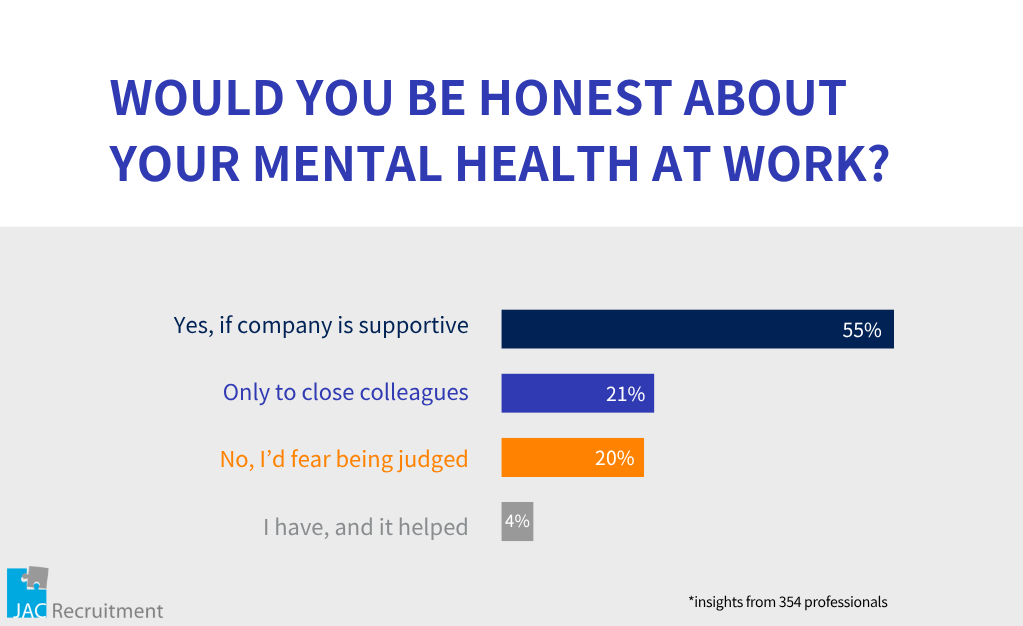Mental health is an important part of our overall wellbeing and it affects how we work, connect, and perform. But how comfortable do people really feel acknowledging mental health challenges in the workplace?
We asked our network: Would you be honest about mental health struggles at work?
Over 350 people responded. While every response came from a different personal context, together they painted a bigger picture: most people are not looking for a spotlight, they are looking for safety, consistency, and support that feels real.

What This Tells Us
1. Most people are open to speak up if the environment feels safe
More than half of respondents said they would open up about mental health ONLY IF the company is supportive. This shows that even when people are aware of their own needs, they are carefully assessing whether they will be met with empathy, understanding, or unintended consequences.
2. Informal support systems still carry a lot of weight
21% of people said they only feel comfortable sharing with close colleagues. Trust at work often begins at a personal level, and even with formal policies in place, many people rely on peers for emotional support.
3. Stigma, real or perceived, remains a barrier
20% worry they will be judged if they speak up. Whether due to a past experience, workplace culture, or broader societal norms, that hesitation is still very present, and worth addressing.
4. Few people have shared their story, and seen a positive outcome
Only 4% said they had shared their mental health challenges and felt it helped. That does not mean support is not available, it may simply mean support is not visible, accessible, or trusted yet.
Building Trust Around Mental Health
It is not just about encouraging openness, it is about making sure mental health is cared for consistently, without needing a moment of crisis to spark support.
Rather than placing burden on individuals to be brave or vulnerable, the focus should be on building systems and cultures where mental health support is simply part of how a company operates.
That includes:
Partnering with qualified mental health professionals
Making support easy to access, confidential, and stigma-free
Training leaders to respond with empathy and consistency
Encouraging regular conversations around wellbeing, not just reactive check-ins
Support does not have to start with a grand gesture. It starts with access, consistency, and care that people can count on, before they feel overwhelmed.
Final Thought
Supporting mental health at work is not about asking everyone to share their struggles. It is a about building the kind of environment where people feel safe, supported, and able to thrive whether they speak up or not.
For employers, that means moving beyond one-initiatives and creating systems that prioritise metal wellbeing as a core part of your culture, not just a response to burnout. When care is consistent, accessible, and professionally supported, it benefits individuals, teams, and the business as a whole.
For professionals, this means knowing that mental health is part of your working life, not separate from it. Whether you choose to open up or manage things privately, you deserve to be in a workplace where support is there when it is needed, without judgement or delay.
Whether you are building healthier cultures or seeking them, we are here to help.
From recruitment and leadership support to candidate care and career guidance, we partner with professionals and organisations who want to move forward with clarity, empathy, and purpose.


